By Taruna Gupta, EES Member and Tweetathon Participant
Tweetathon: a blend of the word ‘tweet’ and ‘marathon’; where twitter messages a continuously posted for a given period focused on a particular topic.
On the 7th of April, the #Eval4Action campaign celebrated their one year anniversary. Evaluation activists, partners, leaders and youth from across the globe participated in global and regional twitter chats as part of the all-day Tweetathon, discussing the importance of “influential evaluation”, and its role in accelerating progress to achieve the Sustainable Development Goals (SDGs). Over the course of the 24 hours, 700 participants posted 14,000 tweets in 10 different languages.
How did it work?
UNFPA, the EvalYouth network and the Global Parliamentarian’s Forum organised 1 global and 7 regional consultations. The Tweetathon kicked off in Asia and moved across the world via the passing of the virtual ‘Evaltorch’. Each consultation lasted one hour and asked 4 questions, with participants responding to the questions or engaging with other tweets.
Question 1: What does influential evaluation mean to you?
Marco Segone, Global
In line with Mr. Segone’s tweet the definition of influential evaluation brought forward varying perspectives with consistent support for transformation, supported by useful evaluation findings. Furthermore, it was reiterated that the use of evaluation in decision making improves the lives of minorities within minorities and positively impacts the environment.
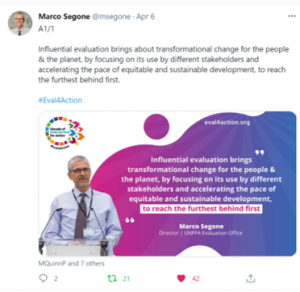
The Iberian Association of Professionals for Evaluation, Europe
APROEVAL, unconventionally suggested that evaluators consider what ‘influences’ the design of their evaluation. This is to better understand the drivers behind the decisions we take about what we evaluate, why we are evaluating it, who we include in the process, what methods we use, who we consider decision makers, how we interact with decision makers, how we encourage them to use our findings and ultimately how to create an influential evaluation. This way of thinking is strongly applicable to decolonising evaluation discussions.
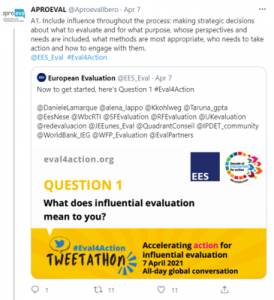
Question 2: What actions for influential evaluation should be prioritized to ensure equitable and sustainable recovery from COVID-19 and get back on track to achieve the SDGs?
EvalPartners, Global
The importance of strengthening national evaluation systems was stressed, particularly in regard to their capacity to generate evidence for leaders to make critical decisions during these uncertain times.
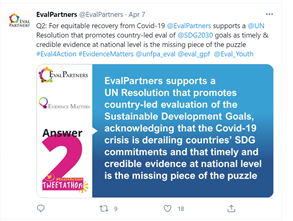
Ziad Moussa, Middle East and North Africa
EvalPartners stated that, to accelerate sustainable recovery, evaluators should not behave a closed community but must include non-traditional actors in ongoing discussions for meeting the SDGs. The role of evaluators in brokering new relations and sharing evidence is essential.
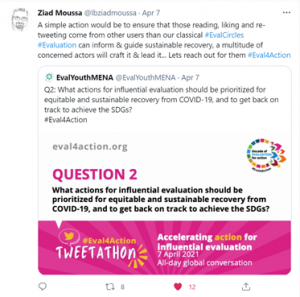
Question 3: How can young and emerging evaluators accelerate action for influential evaluation, particularly in your region?
Regional EvalYouth Chapter, Europe and Central Asia
Young emerging evaluators need to be encouraged to remain students of evaluation throughout their careers, be active volunteers for evaluation initiatives and even go a step further and create an evaluation related network. Finally, the role of young emerging evaluators as activists for social causes, i.e. “having skin in the game”[1], was brought to the fore.
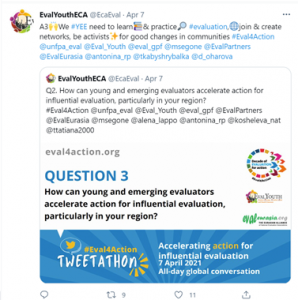
Libby Smith and Tom Kelly, North America
Libby and Tom discussed a key competency of reflective practice in which emerging evaluators learn continuously, staying up to date with current and good practice, applying evaluation standards and ethics[2], and building self-awareness by asking, ‘what have I learned today?’[3] . Furthermore, reflexive practice was mentioned, which is a deeper assessment of how emerging evaluators personal values, experiences and biases affect their work and how the evaluation influences them.
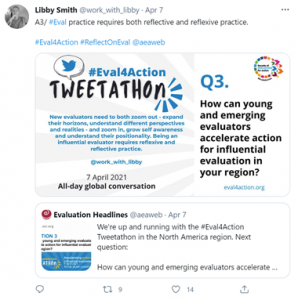
The two provided a few good tips for emerging evaluators beyond the familiar the OECD DAC criteria: look at what is not being captured, through keen observation and in-depth understanding of the subject matter. Furthermore, build relations with commissioners and relevant stakeholders to ensure participation in the evaluation process and adoption of the evaluation findings.
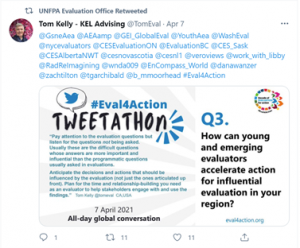
Question 4: What actions are you or your network taking to accelerate influential evaluation?
Alena Lappo and Karin Kohlweg, Europe
Alena and Karin highlighted how the European Evaluation Society is supporting young emerging evaluators under the Peer-to-Peer (P2P+) initiative. P2P+ holds monthly sessions that run for an hour and a half, which provide a safe space where new evaluators can discuss challenges relating to their career and any technical questions relating to monitoring and evaluation.

Ms. Kohlweg brought to attention the online seminars being held by the European Evaluation Society as a result of the COVID-19 pandemic, which tackle some of the most pressing and current issues faced by evaluators around the world.
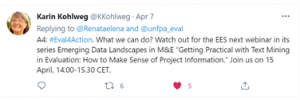
How the Tweetathon helped me and can help other evaluators
- #Eval4Action is the first ever global advocacy campaign and a meaningful initiative in which evaluators should endeavour to participate. It is focused on:
- Accelerating action for influential evaluation, which is key for making the work of evaluators more meaningful; and
- Calling for investment in stronger evaluation systems to inform public policies, which is key for creating true sustainability and shifting towards an evidence informed approach at national, regional and global level.
Moreover, it is co-chaired by the Chair of EvalYouth, and UNFPA is actually ‘Walking the Talk’ by investing in youth and the future of the evaluation profession.
- I think not only as young emerging evaluators but as members of the European Evaluation Society (or any VOPE), we will get what we put in. It is very much a ‘garbage in, garbage out’ scenario. Therefore, to maximise the value of our membership; and to further strengthen our national or regional VOPEs, participation and volunteering is critical.
On a personal level, I have not participated in a Tweetathon before, and it was a great learning experience to be a part of this global dialogue. I was able to share my views and see how they compared with those
[1] Principle 12- Blue Marble Evaluation
[2] Reflexivity in Evaluation by Alecia Kallos
[3] Reflective Practice and Writing: a Guide to Getting Started by Narelle Hampe
